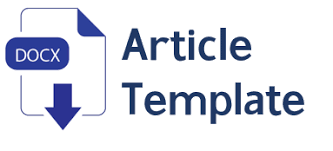Pengaruh Literasi Keuangan dan Tingkat Pendidikan Terhadap Penggunaan Pinjaman Online Dengan Risiko Kredit Sebagai Variabel Moderasi
DOI:
https://doi.org/10.59086/jam.v4i1.739Keywords:
financial literacy, education level, online loan, credit risk, MSMEsAbstract
Downloads
References
Altman, E. I., & Saunders, A. (2019). Credit risk measurement: Developments over the last 20 years. Journal of Banking & Finance, 21(11–12), 1721–1742. https://doi.org/10.1016/S0378-4266(97)00036-8
Atkinson, A., & Messy, F. A. (2020). Promoting financial inclusion through financial education: OECD/INFE evidence, policies and practice (OECD Working Papers on Finance, Insurance and Private Pensions No. 34). OECD Publishing. https://doi.org/10.1787/5k3xz6m88smp-en
Barney, J. B. (1991). Firm resources and sustained competitive advantage. Journal of Management, 17(1), 99–120. https://doi.org/10.1177/014920639101700108
Baron, R. M., & Kenny, D. A. (1986). The moderator–mediator variable distinction in social psychological research. Journal of Personality and Social Psychology, 51(6), 1173–1182. https://doi.org/10.1037/0022-3514.51.6.1173
Chen, H., & Han, X. (2020). The growth of online lending in China: A modern financial miracle or a bubble? Finance Research Letters, 32, 101074. https://doi.org/10.1016/j.frl.2019.101074
Creswell, J. W. (2014). Research design: Qualitative, quantitative, and mixed methods approaches (4th ed.). SAGE Publications.
Dempsey, J. R., & Dulitz, R. D. (2019). The fintech revolution: Impact on financial services. Journal of Digital Banking, 3(3), 251–266.
Duffie, D., & Singleton, K. J. (2012). Credit risk: Pricing, measurement, and management. Princeton University Press.
Ghozali, I. (2018). Aplikasi analisis multivariate dengan program IBM SPSS 25. Badan Penerbit Universitas Diponegoro.
Grant, R. M. (1991). The resource-based theory of competitive advantage: Implications for strategy formulation. California Management Review, 33(3), 114–135. https://doi.org/10.2307/41166664
Grant, R. M. (1991). The resource-based theory of competitive advantage: Implications for strategy formulation. California Management Review, 33(3), 114–135. https://doi.org/10.2307/41166664
Hanushek, E. A., & Woessmann, L. (2020). The economic benefits of improving educational outcomes. OECD Education Working Papers, No. 189. https://doi.org/10.1787/5928b1e5-en
Huston, S. J. (2010). Measuring financial literacy. Journal of Consumer Affairs, 44(2), 296–316. https://doi.org/10.1111/j.1745-6606.2010.01170.x
Jagtiani, J., & Lemieux, C. (2018). The roles of alternative data and machine learning in fintech lending: Evidence from the LendingClub consumer platform (Federal Reserve Bank of Philadelphia Working Paper Series No. 18–15). https://doi.org/10.21799/frbp.wp.2018.15
Lusardi, A., & Mitchell, O. S. (2017). The economic importance of financial literacy: Theory and evidence. Journal of Economic Literature, 52(1), 5–44. https://doi.org/10.1257/jel.52.1.5
Lusardi, A., & Tufano, P. (2020). Debt literacy, financial experiences, and overindebtedness. Journal of Pension Economics and Finance, 19(1), 1–20. https://doi.org/10.1017/S1474747218000221
Otoritas Jasa Keuangan. (2023). Laporan perkembangan fintech lending 2023. OJK. https://www.ojk.go.id
Psacharopoulos, G., & Patrinos, H. A. (2018). Returns to investment in education: A decennial review of the global literature. Education Economics, 26(5), 445–458. https://doi.org/10.1080/09645292.2018.1484426
Remund, D. L. (2010). Financial literacy explicated: The case for a clearer definition in an increasingly complex economy. Journal of Consumer Affairs, 44(2), 276–295. https://doi.org/10.1111/j.1745-6606.2010.01169.x
Sugiyono. (2018). Metode penelitian kuantitatif, kualitatif, dan R&D. Alfabeta.
Tambunan, T. T. H. (2019). UMKM di Indonesia: Masalah dan kebijakan. Jurnal Ekonomi dan Studi Pembangunan, 20(1), 1–15.
Van Rooij, M., Lusardi, A., & Alessie, R. (2018). Financial literacy and stock market participation. Journal of Financial Economics, 101(2), 449–472. https://doi.org/10.1016/j.jfineco.2011.03.006
World Bank. (2020). Indonesia economic prospects: The long road to recovery. World Bank Group. https://www.worldbank.org/en/country/indonesia/publication/indonesia-economic-prospects
Zhang, J., Liu, P., & Li, X. (2022). The role of credit risk in digital lending: Evidence from China. Journal of Financial Stability, 59, 100935. https://doi.org/10.1016/j.jfs.2022.100935
Downloads
Published
How to Cite
Issue
Section
License
Copyright (c) 2025 Ida Bagus Ade Putra Mulyawan, Gde Herry Sugiarto Asana, Laras Oktaviani

This work is licensed under a Creative Commons Attribution 4.0 International License.
This is an open-access journal. All works are published under the Creative Commons license CC-BY which means that all content is freely available at no charge to the user or his/her Institution. Users are allowed to read, download, copy, write, improve, and create derivative creation even for other lawful purposes, this license permits anyone to, as long as they cite and license the derivative creation under similar terms

This work is licensed under a Creative Commons Attribution 4.0 International License.
Most read articles by the same author(s)
- I Made Riawan Setiana, Komang Krishna Yogantara, Gde Herry Sugiarto Asana, Dampak Akses Modal, Pengelolaan Keuangan, dan Kapasitas Manajemen Terhadap Pengembangan UMKM Penerima Kredit Usaha Rakyat di Kecamatan Kuta Utara , Balance : Jurnal Akuntansi dan Manajemen: Vol. 4 No. 1 (2025): April 2025


















